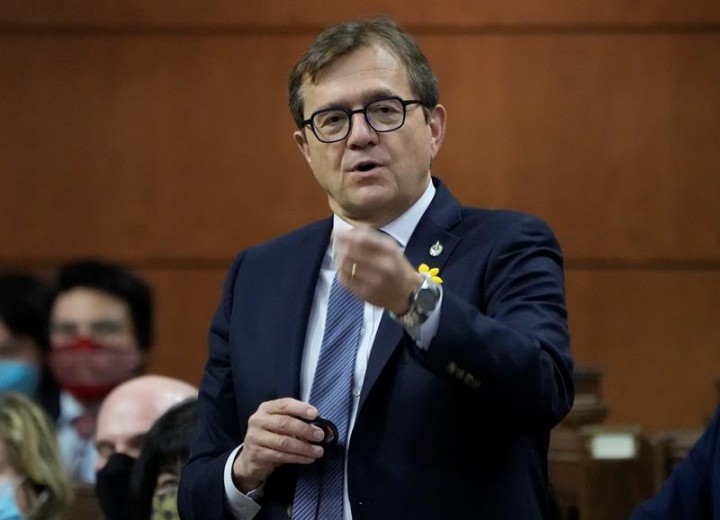OTTAWA — Canada could ship clean hydrogen to Europe in the future to help wean it from its dependency on Russian oil and gas, say federal ministers.
At meetings with G7 counterparts in Berlin this week, Natural Resources Minster Jonathan Wilkinson and Environment Minister Steven Guilbeault said Canada is investing in the development of clean hydrogen, which could help Europe reduce its reliance on Vladimir Putin’s regime for energy.
Canada also played a key role in persuading the G7 — which includes the United States — to phase out international financing of fossil fuel projects by the end of the year, the federal government said. Canada made its own commitment to do so at the COP26 climate-change conference in Glasgow last year.
The pledge at the G7 meeting was part of a package of measures agreed upon to combat climate change, including global action to phase out coal-fired power.
Wilkinson and Guilbeault also pushed for a G7 “hydrogen action pact,” focused on the role hydrogen can play as a clean energy source for the future.
The government has been supporting the development of clean hydrogen, a low-carbon fuel, including in Atlantic Canada, which is closer to Europe than Alberta and Saskatchewan, making it easier to ship.
“Canada remains steadfast in leading the global energy markets and security to ensure support for the international community,” Wilkinson said in a statement.
European countries, including Germany, have made it clear they want to be less reliant on Russian oil and gas.
Earlier this month, EU president Ursula von der Leyen announced a plan to phase out all Russian oil from Europe by early next year, in protest of Putin’s invasion of Ukraine. But Hungary, which is heavily reliant on Russian fossil fuel, has been opposing the move.
In an interview from Berlin, Guilbeault said “in the short term,” Canada may be able to supply European countries with liquefied natural gas as an alternative to energy from Russia.
But “in the middle or long term,” Canada could play a crucial part in supplying Europe with hydrogen.
“Germany, for example, is dependent 55 per cent on Russian gas, and they don’t want that any more. They wanted to diminish and eliminate dependencies to Russian gas,” he said.
Guilbeault said Canada is already one of the largest producers of hydrogen in the world.
“We can be a player, an important player in the hydrogen economy if we seize those opportunities,” he said.
After the meeting ended he said in a statement: “G7 leaders have clearly said that securing energy security and fighting climate change are mutually reinforcing goals.”
The G7 is made up of Canada, France, Germany, Italy, Japan, the United Kingdom and the United States, with the European Union also attending meetings.
In Berlin, G7 nations made significant progress on the global phaseout of coal-fired power, and decarbonizing electricity systems by 2035, the federal government said.
David Ryfisch, international climate policy lead at advocacy group Germanwatch, said the “decarbonization” of electricity sectors “represents a major breakthrough and a clear signal for more renewables and energy efficiency investments.”
“What is lacking is an explicit date for a coal phaseout,” he said. “In order to be able to put pressure on other major emitters to get out of coal, the G7 needs to be very clear that they will end coal by 2030.”
G7 members agreed to double climate financing to help developing countries become greener, as part of the $100-billion commitment.
Guilbeault also argued at the G7 for measures to protect biodiversity and a new legally-binding global agreement to reduce plastic waste.
Last year, the environment minister announced plans to ban harmful single-use plastics in Canada.
This report by The Canadian Press was first published May 27, 2022.
Marie Woolf and Mia Rabson, The Canadian Press






























